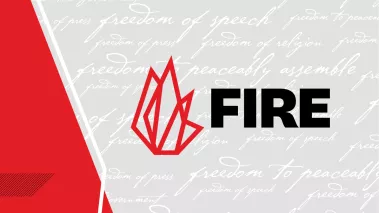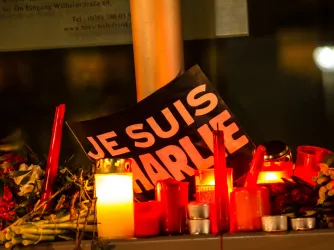Table of Contents
The Blurred Limit of Expression at the Home of the Free Speech Movement

To many people, "Berkeley" is synonymous with "protest." Mentioning the University of California, Berkeley often conjures up images of bearded bohemians and flower children peacefully rallying for a "hippie" cause of the past, such as the famous Free Speech Movement of the mid-sixties. Indeed, Berkeley's protest culture has given the university a reputation for being a bastion for freedom of expression, which can be quite attractive to prospective students looking for a unique college experience. I know because I was once one of them. At Berkeley, so I thought, I would be immersed in an Eden of free speech, a liberal's utopia, where all opinions were tolerated.
Unfortunately, I have found this idealistic vision of my university to be more fiction than fact nowadays. While Berkeley's tolerance for free speech (for the most part) lives up to its reputation, my school has also come to tolerate many illiberal and even unlawful actions that make a mockery of the marketplace of ideas.
As University of Wisconsin-Madison professor Donald Downs pointed out in a recent article (which was also highlighted in a July blog post by Adam), Berkeley has a long history of allowing "free expression" to go too far. Just last November, a group of demonstrators illegally occupied a landmark building on campus, Wheeler Hall, for an entire school day in protest of recent tuition hikes while hundreds of supporters outside cheered them on. Although the police easily gained access to the building briefly after the occupation began, the administration insisted on hearing out the protesters' demands, thus leading to a twelve-hour standoff in which an estimated 3,800 students were not allowed to attend classes-including many of my close friends.
Of course, the demonstrators have every right to express their frustration in a peaceful manner following the university's reasonable, First-Amendment-compliant rules. Indeed, there had been several rallies in the preceding days in which their grievances were aired in a lawful fashion. However, by occupying a university building, subsequently damaging property, and denying thousands of students access to their paid education, the protesters went too far.
Legitimate exercise of the freedom of expression, after all, does not include disrupting classes or events, physical violence, or property destruction. Perhaps Oliver Wendell Holmes explained the limit of free expression best when he said, "The right to swing my fist ends where the other man's nose begins." People are free to exhibit their anger in nonverbal ways up until the point where it interferes with the rights of others. Once expression takes the form of illegal activities, it can be better described as civil disobedience.
Here on The Torch, we've discussed the difference between civil disobedience and the First Amendment right to freedom of expression on several occasions. Robert discussed the distinction in 2006 following violence at Columbia University after students rushed on stage to protest a controversial speaker, and last year, Will covered similar ground in commenting on the punishment of NYU students who had occupied a school cafeteria for 40 hours. Will wrote:
Finally, perhaps the most important overarching point to make here is that civil disobedience and "direct action" protests like building occupations are considered to be powerful statements of moral outrage and protest precisely because they violate existing law or policy. We often receive inquiries from students planning protests about whether or not they can expect to be punished for their act of civil disobedience on campus. Perhaps unsurprisingly, the answer is typically yes.
Therefore, although the intent of the Wheeler Hall occupants to end tuition hikes may have been noble, the vehicle through which they expressed their demands was not. In my experience, the failure of Berkeley's administration and political activists is that they often confuse the two. As a result of this misunderstanding, any movement that claims to have good intentions (or is deemed as such by the administration) is essentially given a green light to violate campus rules and even state laws. Thus, civil libertarianism at Berkeley has often evolved into libertinism, as demonstrated through several events following the Wheeler Hall occupation.
For example, less than two weeks after the occupation, Chancellor Robert Birgeneau's house was attacked when 40 to 75 protesters overturned plants, broke windows, and threw lit torches at police. "My wife and I genuinely feared for our lives," recalled the Chancellor. Sadly, this is just one example of lawlessness. In February of this year, more than 200 rioters took to the streets of Berkeley, vandalizing private businesses, burning public property, and even hurling dumpsters at police. Berkeley's student newspaper, The Daily Californian, captured the riot in this chilling video.
Unfortunately, Berkeley's confusion about the limit of expression has morphed into some lawless protesters' illiberal acceptance of violence as a means of activism. Such reckless actions do not promote freedom of speech but hinder it. How, after all, can two parties have a true exchange of ideas when one side is threatening violence? To be fair, the demonstrators who committed the illegal acts are a minority of the larger protest movement and are unrepresentative of the whole. However, this fact does not excuse the acceptance of lawlessness as a method of expression by many administrators, students, and protesters.
As a California Golden Bear, I am proud of my university's history of open discourse. In practically everything, my college experience at Berkeley thus far has been everything I expected and more. I am unafraid to admit that I genuinely love my college. Yet, love is not equivalent to blind devotion. I recognize the faults in my school and urge it to change- partly because it is in my self-interest. The free exchange of ideas cannot survive where there is also a free exchange of fists. Until my university fully comprehends this principle, free speech will continue to be chilled by lawlessness at Berkeley.
Recent Articles
FIRE’s award-winning Newsdesk covers the free speech news you need to stay informed.

A decade after ‘Charlie Hebdo’ killings, we are still failing blasphemers

FIRE to SCOTUS: TikTok ban violates Americans' First Amendment rights

California and other states are rushing to regulate AI. This is what they’re missing
